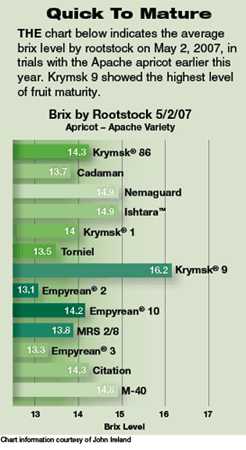Promising New Rootstocks For Almonds And Stone Fruit
 You can hear the excitement in John Ireland’s voice when he starts talking about Krymsk® rootstocks, which come from Russia, near the eastern shores of the Black Sea. “It is the foremost prunus germplasm collection,” says Ireland, who heads up research and development for Fowler Nurseries in Newcastle, CA. “Their germplasm offers diversity that we really haven’t seen before.”
You can hear the excitement in John Ireland’s voice when he starts talking about Krymsk® rootstocks, which come from Russia, near the eastern shores of the Black Sea. “It is the foremost prunus germplasm collection,” says Ireland, who heads up research and development for Fowler Nurseries in Newcastle, CA. “Their germplasm offers diversity that we really haven’t seen before.”
Until now, that is. Dave Weil of Varieties International in Oregon has put together a group of nurseries that will be bringing some of the Krymsk rootstocks, as well as some others, to the U.S. Named the Progressive Genetics Group (P2G), the organization has been formed to facilitate the discovery, testing, and introduction of novel genetics to horticulture. Besides Fowler, the members include Bright Nursery, Duarte Nursery, and Sierra Gold Nurseries. Weil believes that having a group of nurseries involved expands the knowledge base to provide the most reliable information possible. For now, P2G is concentrating on Prunus rootstocks, namely rootstocks for almonds, cherries, nectarines, peaches, and plums.
Trees will be available for planting in 2009, says Ireland, though growers will have to contact the nurseries by this coming April to arrange custom-budding. For now, tree orders will be limited to a small number per grower, he says. “It’s appropriate given the fact that we need to look at these (combinations) further,” Ireland says. “Growers shouldn’t just dive in anyway; we’d like to see a little more caution than that.”
Caution is warranted because although the rootstocks are extremely promising, there’s no way of knowing how they will work with all varieties, says Ireland. “There are no compatibility issues that we’re aware of, but we’re not certain of cold hardiness, for example,” he says. “Will they tolerate Michigan winters? I don’t know.”
Regional variation is the reason the NC-140 national rootstock trial program plants trees all over the country, says Ireland. In addition, certain rootstocks favor certain management systems. For example, the Krymsk 1 rootstock (see below) doesn’t like stress. “But other rootstocks might not care for being pushed hard with lots of water and fertilizer,” he says. “(Rootstock performance) may depend on what your management system is.”
In other words, results may vary not only from one location to another, but from one management system to another. But that said, the rootstocks are looking interesting after initial testing, says Ireland. Here’s a list of the rootstocks that will be available, along with his comments.
– Krymsk® 1 (VVA-1 cv) USPP#15,995 is a promising rootstock for both European and Japanese plums and perhaps apricots, offering tree vigor reduction and good fruit size. Some fruit size enhancement may occur. Krymsk 1 has root-knot nematode resistance and some resistance to lesion nematode. Anchorage is good. Some root suckers are produced. This rootstock has been in the 2001 and 2002 NC-140 peach rootstock trial showing promise as a peach rootstock with high yield efficiency and enhanced fruit size. However, compatibility with peaches and nectarines needs further investigation. Krymsk 1 is not likely a good rootstock for areas with high bacterial canker pressure.
– Krymsk® 5 (VSL-2 cv) USPP#15,723 and Krymsk® 6 (LC-52) USPP#16,114 are precocious cherry rootstocks with vigor, using Bing, similar to Gisela 6 and Gisela 12, respectively. In California, flower densities are lower than densities on Gisela, resulting in more balanced fruit loads with productive varieties. Yet even with lower flower densities, trees produced a crop equivalent to Gisela this year in a region of the Pacific Northwest with reduced fruit load caused by frost. Virus-free budwood must be used due to the virus sensitivity of these rootstocks. These rootstocks also produce some root suckers. Anchorage appears good.
– Krymsk® 9 (Myrocot) PAF is a rootstock for apricots that has repeatedly advanced bloom a few days and has advanced fruit maturity four to six days. The tree vigor is about 60% of Citation. This is a cross of apricot and myrobalan plum. Krymsk 9 has root-knot nematode resistance.
– Ishtara® is a rootstock originating in France (not an exclusive rootstock of P2G) which appears interesting for peaches and nectarines. The rootstock has shown tree vigor about 70% of Nemaguard and enhanced fruit size in trials. There is root-knot nematode resistance and no root suckers. Anchorage on young trees is a concern. Ishtara was included in 1994 NC-140 peach rootstock trials. Ishtara is not likely a good rootstock for areas with high bacterial canker pressure. Compatibility appears excellent.
– Empyrean® 2 is a rootstock from Italy for peaches and nectarines. Tree vigor is about 70% of Nemaguard with good fruit size. It has root-knot nematode resistance and low sensitivity to lesion nematode. Some root suckers are produced. Empyrean 2 is reported to have tolerance to heavy, wet soils.
– Puenteâ„¢ is a plum interstem that can also be used as a rootstock, particularly in heavy soils, and has broad sweet cherry compatibility. As an interstem, Puente facilitates the use of many different rootstocks for sweet cherries.









